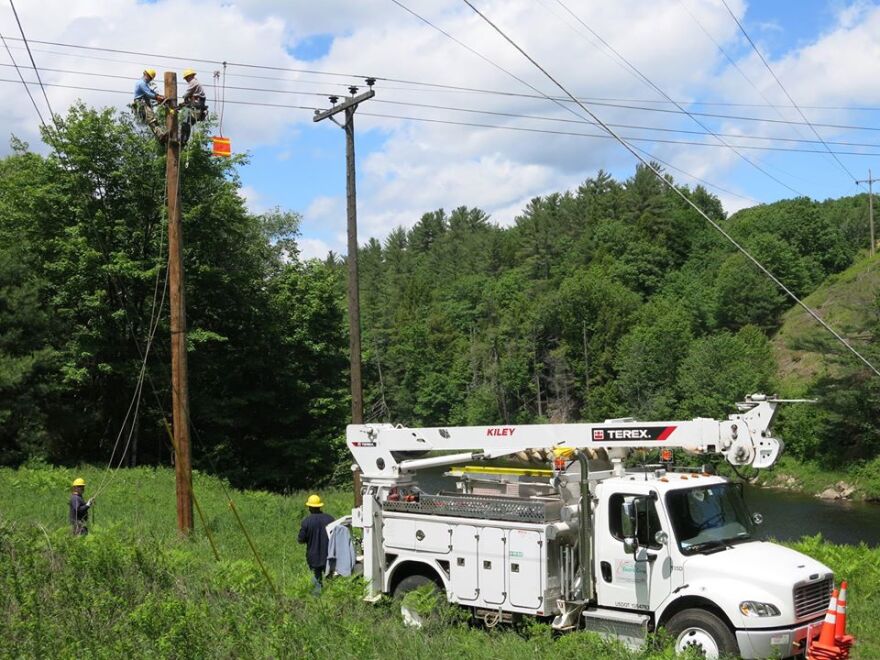This story was originally produced by the New Hampshire Bulletin, an independent local newsroom that allows NHPR and other outlets to republish its reporting.
In a move energy experts believe will transform the state’s energy market, the Public Utilities Commission on Wednesday unanimously approved community power rules that will allow cities and towns to save money and prioritize renewable energy.
The rules advance efforts that date back more than 25 years to bring down New Hampshire’s high energy costs by enabling market competition. The vote comes as the cost of electricity is set to spike in August.
The PUC has rejected other measures that would reduce demand for electricity, like its November decision to deny the state’s energy efficiency plan and slash funding for energy efficiency, a move reversed by House Bill 549. The commission’s makeup has since changed, with the addition of two new members.
Proponents say allowing communities to band together will bring big benefits, including lower energy costs through increased competition and greater control over buying energy when it’s cheapest. And clean energy advocates see community power as a way for localities to opt for renewable energy.
“This gives people some hope in the face of 22-cent retail electricity,” said Consumer Advocate Don Kreis. “This is an avenue for communities to take that challenge into their own hands and see what creative, dynamic, future-oriented energy policy can do for people’s electricity bills.”
Without rules in place, the commission has already rejected five community power plans put before it, including proposals by Keene, Harrisville, Rye, Hanover, and Lebanon. The new rules will clear at least one barrier for communities that wish to start purchasing power for themselves by creating a framework for community power programs.
The rules cover the formation of community power programs and set ground rules about how utilities interact with them, like what information utilities must share and how often. They also establish requirements for protecting consumers’ data and ensuring it remains anonymous.
“These are landmark rules as they realize some of the main efforts that have spanned two decades here in New Hampshire,” said PUC Commissioner Carleton Simpson, ahead of the commission’s vote during a hearing on Wednesday.
The rules were originally proposed by the Community Power Coalition of New Hampshire in December. The commission accepted public comment on the rules in March and used some of the input from the public and utilities to make adjustments. Those final changes were approved unanimously by the commission Wednesday.
Simpson said the rules advance efforts that have been underway since 1996, when utilities were restructured and required to sell off power generation with the hope of allowing for market competition and reducing energy costs.
But the state has struggled to deliver on that promise. And while residents have the option of purchasing energy on the competitive market, few actually do so. Some may be unaware they have the option, and signing up requires additional research and effort. Simpson said community power can change that.
“Promulgation of these rules before us today, I believe, will transform the state’s electricity supply market by enabling communities to select their supplier and resource mix directly,” he said. Now, he said, “citizens of every New Hampshire community have a voice to directly express what they want as an electricity customer.”
Proponents of community power praised the commission’s decision, which followed multiple delays.
Now that the rules have cleared the PUC, they also require approval from the Joint Legislative Committee on Administrative Rules, which will next meet Aug. 18.
“I am really glad that the PUC has finally approved its rules, and I hope that JLCAR speedily adopts them verbatim,” Kreis said.
Proponents of community power such as Kreis have been pointing to it as one possible solution as the state faces surging energy prices. Community power programs can go to market more often than the regulated utilities, which allows them to buy energy when it’s cheap and keep costs down for customers.
Simpson pointed to other states where community power has already been successful. States that already allow for community power include Massachusetts, Rhode Island, New Jersey, New York, Virginia, California, Ohio, and Illinois.
“This puts every community in a position to have a say in where their energy comes from, and to do so in a way that accesses market prices and lowers costs for folks,” said Henry Herndon, an energy consultant affiliated with the Community Power Coalition of New Hampshire.
“It’s transformative,” he said.
New Hampshire Bulletin is part of States Newsroom, a network of news bureaus supported by grants and a coalition of donors as a 501c(3) public charity. New Hampshire Bulletin maintains editorial independence. Contact Editor Dana Wormald for questions: info@newhampshirebulletin.com. Follow New Hampshire Bulletin on Facebook and Twitter.







